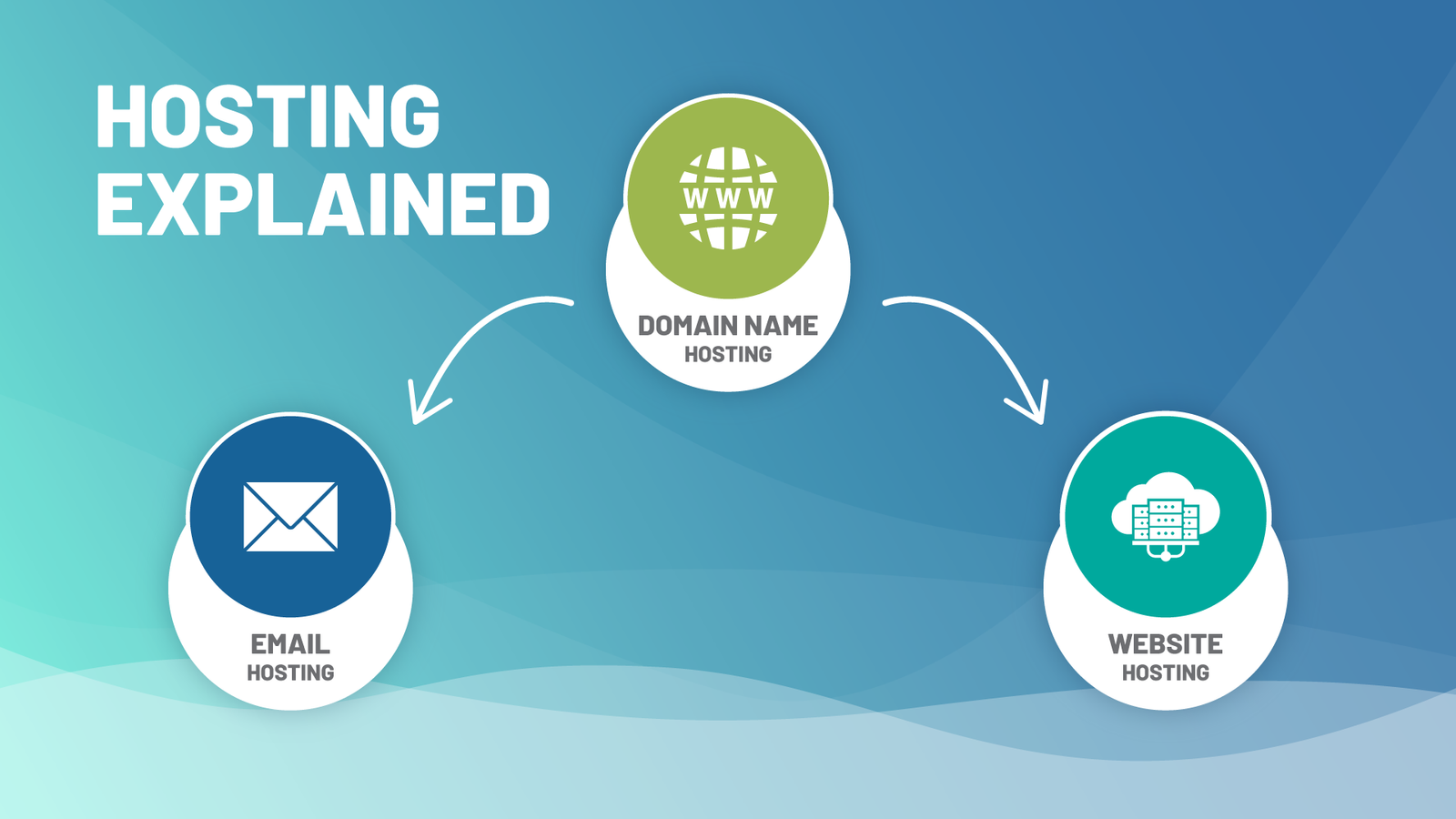When you are looking for web hosting, it is important to understand how the pieces fit together so you can choose the best option for your business. Most businesses think “It’s a website, it’s one thing”, but there are actually 3 common parts that make up a website. Domain, website files, and email. They can be hosted together or separately but they all work together.
A domain provides a unique address for your website, while website hosting provides the servers and infrastructure to store and serve your website to the world. Email hosting allows you to have professional email addresses that use your domain name, helping to further establish your online presence.
Domain
A domain is what a customer types into a search bar access a website. It’s the unique name that identifies an online website, for example, www.greentulipdesign.com.
Website
To oversimplify, a website is just a set of files that connect to one another. When you host a website, you rent space on a server where you can store all the files that make up that website.
How a Domain and Website Work Together
When someone types your domain into their web browser, the browser connects to the server where your website is hosted, retrieves the files and displays the website to the user. The domain and hosting work together to make your website accessible to the world.
In short, a domain is the address, while website hosting is the physical location where your website files are stored and served to the world.
Website Hosting and Domain Hosting
Domains and websites are typically hosted separately. A domain is registered with a domain registrar, while a website is hosted with a web hosting provider.
The domain registrar is responsible for managing the registration of the domain name, including managing the DNS (Domain Name System) records that connect the domain name to the IP address of the web server where the website is hosted.
The web hosting provider, on the other hand, provides the servers and infrastructure needed to store the files that make up a website and make it accessible to the world via the internet.
Once you have registered your domain and set up your web hosting account, you can then link your domain to your web hosting account so that when someone types your domain into their web browser, they are directed to your website.
In some cases, it is possible to register a domain and purchase hosting from the same company, but they are still technically separate services that can be managed independently.
Type of Web Hosting
There are two different hosting approaches to a website: Self-hosting and managed hosting.
Self-Hosting
Self-hosting refers to hosting a website on your own server, either in your own data center or on a server you have rented or purchased. With self-hosting, you have complete control over the server and are responsible for all aspects of website hosting, including server configuration, software updates, security, backups, and more.
Self-hosting is often a good choice for experienced technical users who have the skills and resources to manage their own server. However, it can also be time-consuming and require a significant investment in hardware and software, as well as ongoing maintenance and support.
Managed Hosting
Managed hosting, on the other hand, refers to hosting your website with a web hosting provider that manages the server and takes care of all the technical aspects of website hosting for you. With managed hosting, you simply upload your website files and the web hosting provider takes care of the rest.
Managed hosting is a good choice for individuals and organizations who don’t have the technical expertise to manage their own server, or who want to focus on their website content and marketing, rather than server management. Managed hosting typically costs more than self-hosting but provides a more hands-off approach, with the web hosting provider handling server management and support.
In conclusion, self-hosting is a good choice for technical users who want complete control over their server, while managed hosting is a good choice for non-technical users who want a more hands-off approach to website hosting.
Email is often connected to domain and website hosting because some web hosting providers also offer email hosting services.
When you register a domain, you typically have the option to create email addresses that use your domain name, for example, info@example.com. These email addresses are hosted on email servers provided by your web hosting provider or by a separate email hosting provider, such as Google Workspace.
By having email addresses that use your domain name, it helps to establish a professional image for your business and can make it easier for people to remember and find your email address.
The connection between email and domain and website hosting is that they all play a role in creating a complete online presence for your business. A domain provides a unique address for your website, while website hosting provides the servers and infrastructure to store and serve your website to the world. Email hosting allows you to have professional email addresses that use your domain name, helping to further establish your online presence.
Third-Party Email Hosting
There are several reasons why someone might choose to use a third-party email hosting service like Google Workspace:
Reliability and Uptime
Third-party email hosting providers like Google have highly reliable servers and infrastructure, which can ensure that your email is always available and accessible.
Security
Third-party email hosting providers invest in robust security measures to protect your email and data. This can include things like encryption, spam and virus filtering, and backup and recovery systems.
Features and Functionality
Third-party email hosting services like Google Workspace often come with advanced features and tools, such as online storage, shared calendars, and collaboration tools that can make it easier for teams to work together and share information.
Scalability
As your business grows, your email needs can change. Third-party email hosting providers offer scalable solutions that can grow with your business, so you can add or remove users as needed.
Technical Support
Third-party email hosting providers offer technical support, so you can get help quickly if you have any issues with your email.
Cost-Effective
Third-party email hosting providers often offer more cost-effective solutions than hosting email on your own server, especially if you have a large number of users or need advanced features.
In conclusion, using a third-party email hosting service like Google Workspace can provide a number of benefits, including increased reliability, security, and functionality, as well as technical support and cost savings.
Hosting with Green Tulip Design
Green Tulip Design offers managed website hosting and domain hosting in addition to our web design and digital marketing services. Schedule a call with us to learn more about it.




